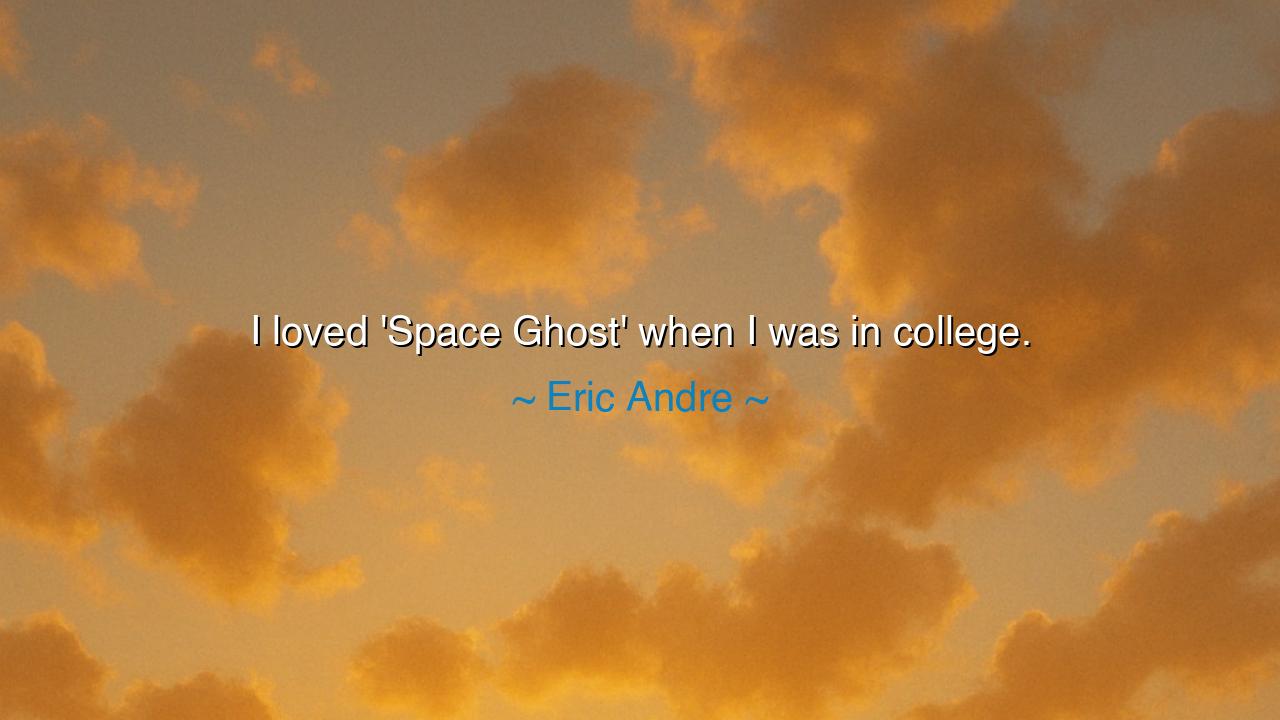
I loved 'Space Ghost' when I was in college.






Hear the words of Eric Andre, jester and truth-teller of our age, who confessed with simple reverence: “I loved ‘Space Ghost’ when I was in college.” At first glance, these words may appear lighthearted, a mere reflection on a cartoon watched in youthful days. Yet within them lies a hidden wisdom, a reminder of how the strange, the absurd, and the playful can shape the soul during its most formative years. For what a man loves in his youth becomes the seedbed of his imagination, and what nourishes him in laughter often guides him in his craft.
The origin of this utterance lies in “Space Ghost Coast to Coast,” a show born in the 1990s, which took an old hero of Saturday morning cartoons and transformed him into a surreal, satirical talk-show host. It was absurdity made art, parody made prophecy. Andre, then a college student, drank from its well. In its strangeness he saw freedom, in its irreverence he saw possibility, in its chaos he saw creation. Thus the words of his confession reveal not only a memory, but the root of his own comedic vision: to embrace the unorthodox, to welcome the bizarre, to honor humor that disrupts the ordinary.
This is not without precedent in history. Consider the ancient comedies of Aristophanes, staged in the theaters of Athens. His plays were crude, chaotic, satirical, mocking both politicians and the gods themselves. Yet they were loved by the people, for they revealed truths that could not be spoken openly in solemn form. They brought laughter, but also reflection. In the same way, shows like Space Ghost carried absurdity as their sword, cutting through the dullness of routine to show new ways of seeing. Andre, inheritor of this tradition, found in that strangeness the courage to forge his own path of comedy.
But mark this: Andre’s love for such a show during college is no accident. For college, or the season of youth’s awakening, is the time when one’s mind is most open, when ideas and influences seep deep into the soul. The shows you love, the books you read, the voices you follow in those years—they shape the person you will become. As the clay is soft in the potter’s hand, so too is the spirit soft in youth, molded by what it consumes. The words of Andre, though humorous, remind us to be mindful of what we let shape us in our formative years.
Moreover, in declaring his love for such a bizarre creation, Andre also reminds us of the power of inspiration in unlikely places. Great ideas do not always spring from solemn tomes or noble traditions; they often come from the playful, the absurd, the overlooked. Just as Leonardo da Vinci once studied the flight of birds to design machines, so too may a comedian study the strangeness of a late-night cartoon and discover within it the seeds of genius. To love is to draw nourishment, and from nourishment comes creation.
The lesson, therefore, is this: honor the things that stir your imagination, no matter how strange they may appear. Do not despise the playful, the ridiculous, or the unorthodox, for often they hold the spark that ignites your future work. What you love in passing may become the foundation of what you build in life. Like Andre, let your influences inspire rather than confine you. Use them as stepping-stones to carve your own vision, your own art, your own path.
So I counsel you: take joy seriously. Embrace the shows, the stories, the creations that make your spirit come alive. Protect space in your life for wonder, laughter, and even absurdity, for they may become the wellsprings of wisdom and originality. For in the end, what you love deeply, even in jest, becomes part of who you are. And as Eric Andre’s journey shows, the strange cartoon once loved in college may become the guiding flame for a lifetime of creativity.






AAdministratorAdministrator
Welcome, honored guests. Please leave a comment, we will respond soon